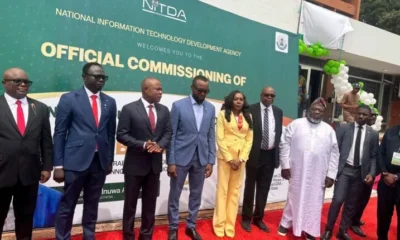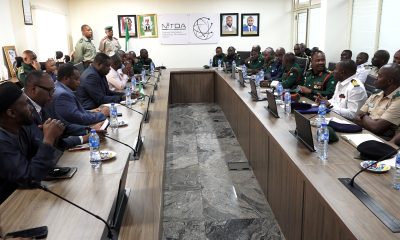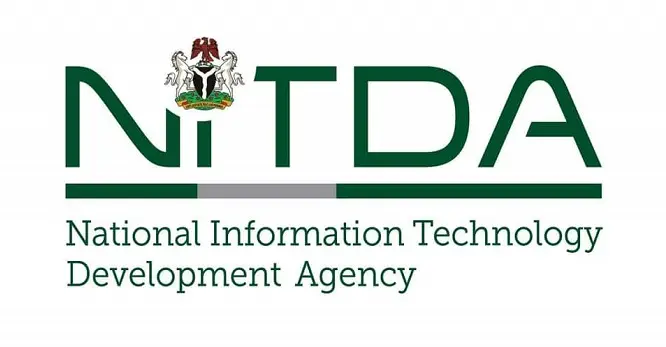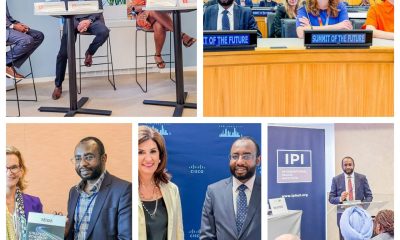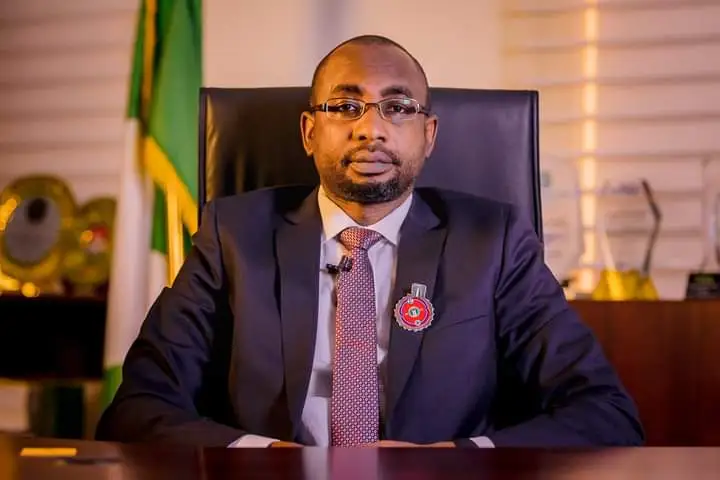News
Empowering Nigeria’s Future: The Digital Literacy for All Initiative
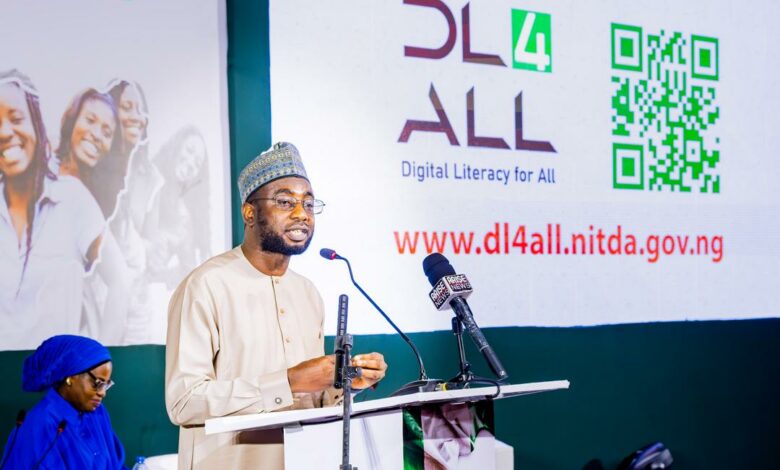
Empowering Nigeria’s Future: The Digital Literacy for All Initiative
“The new source of power is not money in the hands of a few, but information in the hands of many.” – John Naisbitt.
By Ernest Ogezi
The National Information Technology Development Agency (NITDA), in collaboration with the National Youth Service Corps (NYSC) and GetBundi Education Technology, has launched the Digital Literacy for All (DL4ALL) Initiative. This ambitious project aims to equip a significant portion of Nigeria’s population with foundational digital literacy skills, propelling the nation towards achieving a 70% digital literacy rate by 2027. By focusing on six core competency areas—Devices and Software Operation, Information & Data Literacy, Communication and Collaboration, Digital Content Creation, Safety, and Problem Solving—DL4ALL seeks to provide Nigerians with the necessary tools to thrive in a digital world.
DL4ALL takes into cognizance the urgency of equipping individuals with skills to access and utilize online resources for education, employment, and government services safely. This initiative also aims to protect users from cyber threats and misinformation, enabling them to communicate and collaborate effectively using digital tools. The overarching goal is to develop the digital fluency required for many in-demand jobs. The initiative employs a multi-stakeholder approach, leveraging the expertise and reach of various actors across Nigeria. A key component is the partnership with NYSC to train corps members as Digital Literacy Champions. These champions will undergo comprehensive training to enhance their teaching skills, enabling them to disseminate digital literacy knowledge to their peers and communities. Additionally, members of the creative industry will receive specialized training in digital marketing, video editing, and graphics, further broadening the initiative’s impact.
GetBundi Education Technology plays a pivotal role in DL4ALL’s success. They have developed a digital literacy framework for Africa, which NITDA has adopted. This collaboration includes creating learning videos and infographics in English, Pidgin English, Yoruba, Hausa, and Igbo by the end of 2024. The initial phase, however, will be conducted in English. The training will be delivered in three life skills areas: video editing, content creation, and digital marketing. These skills will be imparted to Digital Literacy Ambassadors (DLAs) during their service year. The partnership with Mind the Gap ensures a cost-effective implementation, utilizing existing structures rather than creating new ones.
The DL4ALL initiative is crucial for achieving NITDA’s Strategic Roadmap and Action Plan 2.0 (SRAP 2.0), which aims to nurture an innovative and entrepreneurial ecosystem in line with President Tinubu’s administration’s priority of reforming the economy for sustained inclusive growth. This alignment underscores the initiative’s significance in driving Nigeria’s socio-economic development and global competitiveness. The pilot phase, starting in 12 states, will train 360 DLAs, reaching over 302,400 end beneficiaries by the end of 2024. The full program envisions training 21,000 corps members over three years, impacting 30 million Nigerians. This extensive reach will significantly contribute to Nigeria’s digital transformation, enhancing ICT’s contribution to the GDP and fostering a dynamic ecosystem that propels economic growth.
DL4ALL is a transformative initiative designed to empower Nigerians with essential digital skills, driving the nation towards a more inclusive and prosperous future. Through strategic partnerships and innovative training methods, NITDA and its collaborators are laying the foundation for a digitally literate Nigeria, poised to compete on the global stage. This initiative is a testament to the power of collaboration and the importance of digital literacy in today’s technology-driven world.
Headlines
Noble Ladies Champion Women’s Financial Independence at Grand Inauguration in Abuja

Women from diverse backgrounds across Nigeria and beyond gathered at the Art and Culture Auditorium, Abuja, for the inauguration and convention of the Noble Ladies Association. The event, led by the association’s Founder and “visionary and polished Queen Mother,” Mrs. Margaret Chigozie Mkpuma, was a colourful display of feminine elegance, empowerment, and ambition.
The highly anticipated gathering, attended by over 700 members and counting, reflected the association’s mission to help women realise their potential while shifting mindsets away from dependency and over-glamorization of the ‘white collar job.’ According to the group, progress can be better achieved through innovation and creativity. “When a woman is able to earn and blossom on her own she has no reason to look at herself as a second fiddle,” the association stated.
One of the association’s standout initiatives is its women-only investment platform, which currently offers a minimum entry of ₦100,000 with a return of ₦130,000 over 30 days—an interest rate of 30 percent. Some members invest as much as ₦1 million, enjoying the same return rate. Mrs. Mkpuma explained that the scheme focuses on women because “women bear the greater brunt of poverty” and the platform seeks “to offer equity in the absence of economic equality.”
Education is also central to the Noble Ladies’ mission, regardless of age. Their mantra, “start again from where you stopped,” encourages women to return to school or upgrade their skills at any stage in life. The association believes that financial stability is vital in protecting women from cultural practices that dispossess widows of their late husbands’ assets, while also enabling them to raise morally and socially grounded families.
Founded on the vision of enhancing women’s skills and achieving financial stability, the association rests on a value system that discourages pity and promotes purpose. “You have a purpose and you build on that purpose to achieve great potentials and emancipation,” Mrs. Mkpuma said.
A criminologist by training and entrepreneur by practice, she cautions against idleness while waiting for formal employment. “There are billions in the informal and non-formal sectors waiting to be made,” she said, rejecting the “new normal of begging” and urging people to “be more introspective to find their purpose in life and hold on to it.”
Mrs. Mkpuma’s management style keeps members actively engaged, focusing on vocational skills and training to prepare them for competitive markets. She is exploring “innovative integration of uncommon technologies” and is already in talks with international franchises to invest in Nigeria, with Noble Ladies as first beneficiaries.
The association’s core values include mutual respect, innovation, forward-thinking, equal opportunity, and financial emancipation. With plans underway to establish a secretariat in the heart of Abuja, the group aims to expand its impact.
The event drew high-profile guests, including former Inspector General of Police, Mike Okiro, and a host of VIPs, marking a significant milestone in the association’s drive for women’s empowerment.
Headlines
NEPZA, FCT agree to create world-class FTZ environment

The Nigeria Export Processing Zones Authority (NEPZA) has stepped in to resolve the dispute between the Federal Capital Territory Administration and the Abuja Technology Village (ATV), a licensed Free Trade Zone, over the potential revocation of the zone’s land title.
Dr. Olufemi Ogunyemi, the Managing Director of NEPZA, urged ATV operators and investors to withdraw the lawsuit filed against the FCT administration immediately to facilitate a roundtable negotiation.
Dr. Ogunyemi delivered the charge during a courtesy visit to the Minister of the Federal Capital Territory, Barrister Nyesom Wike, on Thursday in Abuja.
You will recall that the ATV operators responded to the revocation notice issued by the FCT administration with a lawsuit.
Dr. Ogunyemi stated that the continued support for the growth of the Free Trade Zones Scheme would benefit the nation’s economy and the FCT’s development, emphasizing that the FCT administration recognized the scheme’s potential to accelerate industrialisation.
Dr. Ogunyemi, also the Chief Executive Officer of NEPZA, expressed his delight at the steps taken by the FCT minister to expand the economic frontier of the FCT through the proposed Abuja City Walk (ACW) project.
Dr. Ogunyemi further explained that the Authority was preparing to assess all the 63 licensed Free Trade Zones across the country with the view to vetting their functionality and contributions to the nation’s Foreign Direct Investment and export drives.
“I have come to discuss with His Excellency, the Minister of the Federal Capital Territory on the importance of supporting the ATV to succeed while also promoting the development of the Abuja City Walk project. We must work together to achieve this for the good of our nation,” he said.
On his part, the FCT Minister reiterated his unflinching determination to work towards President Bola Ahmed Tinubu’s Renewed Hope Agenda by bringing FDI to the FCT.
“We must fulfil Mr. President’s promises regarding industrialization, trade, and investment. In this context, the FCT will collaborate with NEPZA to review the future of ATV, a zone that was sponsored and supported by the FCT administration,” Wike said.
Barrister Wike also said that efforts were underway to fast-track the industrialisation process of the territory with the construction of the Abuja City Walk.
The minister further said the Abuja City Walk project was planned to cover over 200 hectares in the Abuja Technology Village corridor along Airport Road.
According to him, the business ecosystem aimed to create a lively, mixed-use urban center with residential, commercial, retail, hospitality, medical, and institutional facilities.
He added that the ACW would turn out to be a high-definition and world-class project that would give this administration’s Renewed Hope Agenda true meaning in the North-Central Region of the country.
Barrister Wike also indicated his continued pursuit of land and property owners who failed to fulfil their obligations to the FCT in his determination to develop the territory.
Headlines
Benue IDPs block highway, demand return to ancestral homes

Vehicular movement along the Yelwata axis of the Benue–Nasarawa highway was brought to a standstill on Wednesday as Internally Displaced Persons, IDPs, staged a protest, demanding immediate return to their ancestral homes.
The protesters, believed to be victims of persistent attacks by suspected herdsmen, blocked both lanes of the busy highway for several hours, chanting “We want to go back home”.
The protest caused disruption, leaving hundreds of motorists and passengers stranded.
Eyewitnesses said the displaced persons, many of whom have spent years in overcrowded IDP camps, are expressing deep frustration over the government’s delay in restoring security to their communities.
“We have suffered enough. We want to return to our homes and farms,” one of the protesters told reporters at the scene.
Security personnel were reportedly deployed to monitor the situation and prevent any escalation, though tensions remained high as of press time.
Efforts to reach the Benue State Emergency Management Agency, SEMA, and other relevant authorities for comment were unsuccessful.
-

 Headlines4 years ago
Headlines4 years agoFacebook, Instagram Temporarily Allow Posts on Ukraine War Calling for Violence Against Invading Russians or Putin’s Death
-

 Headlines4 years ago
Headlines4 years agoNigeria, Other West African Countries Facing Worst Food Crisis in 10 Years, Aid Groups Say
-

 Foreign3 years ago
Foreign3 years agoNew York Consulate installs machines for 10-year passport
-

 News1 year ago
News1 year agoZero Trust Architecture in a Remote World: Securing the New Normal
-

 Entertainment3 years ago
Entertainment3 years agoPhyna emerges winner of Big Brother Naija Season 7
-

 Headlines1 year ago
Headlines1 year agoNigeria Customs modernisation project to check extortion of traders
-

 Entertainment2 years ago
Entertainment2 years agoMovie download platform, Netnaija, announces closure
-

 Economy2 years ago
Economy2 years agoWe generated N30.2 bn revenue in three months – Kano NCS Comptroller


